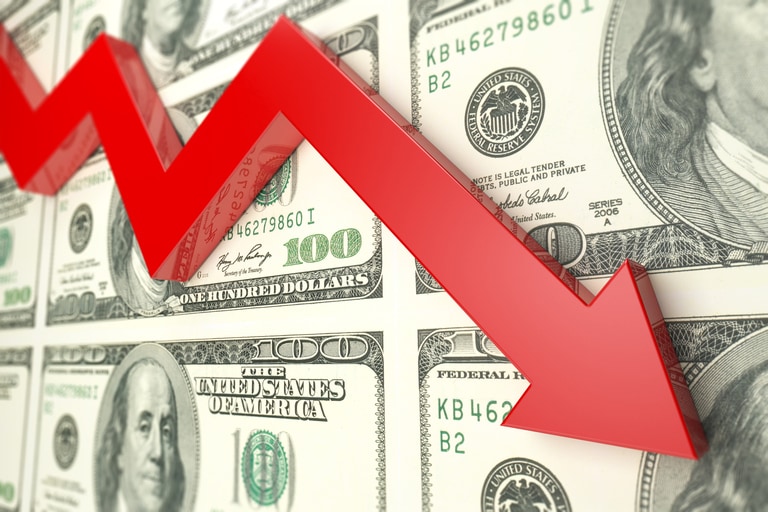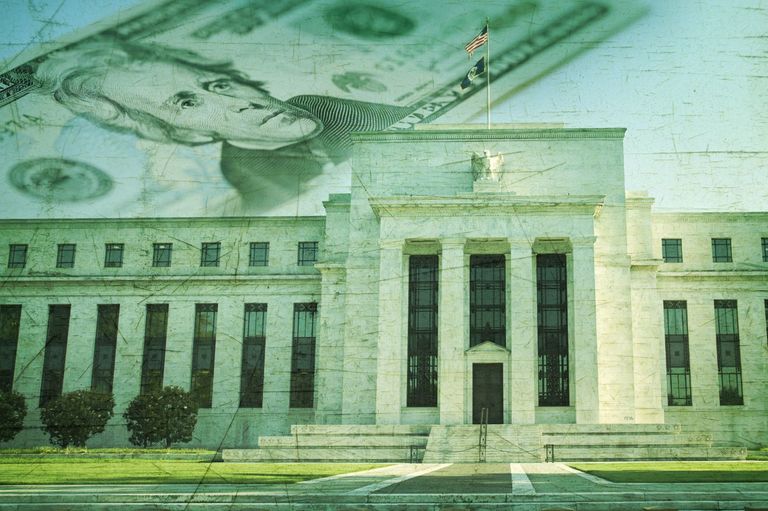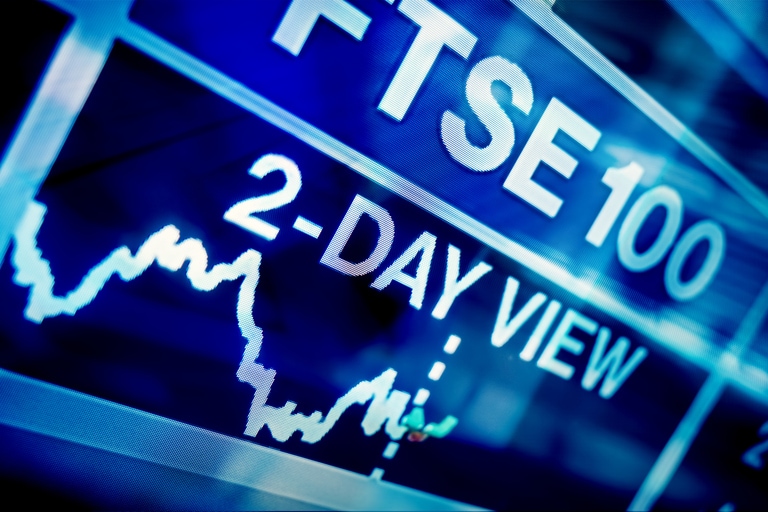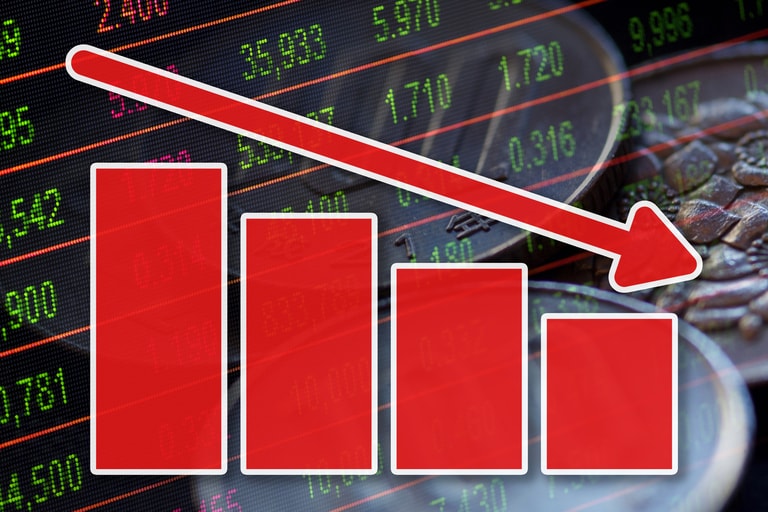Read our pick of the top stories to look out for this week (12-16 April), and view our key company earnings schedule.
In this week's video, Michael looks ahead to a busy week which includes US and China retail sales and China Q1 GDP, plus earnings results from US banks, and the Coinbase initial public offering (IPO). Michael also looks at some of the key chart points on a range of markets, including the FTSE 100, S&P 500, EUR/USD, GBP/USD and bitcoin.
China trade balance (March)
Tuesday: The Chinese economy finished 2020 on a strong note, its surplus hitting a record high in December. The strength was primarily a result of the continued lockdowns in the rest of the world, which led exports of PPE and other medical-related products do well. As vaccines continue to get rolled out across the world, this trend could slow in the coming months.
In the most recent China trade data for February, we saw a big rebound in exports as global demand continued to show resilience. Exports rose 18.1% and while it can be argued that the number was flattering due to the China lockdown at the beginning of last year, which shut factories down, the direction of travel still looks impressive. Imports also beat expectations, rising 6.5%, in a sign that domestic demand is also recovering, a good omen for the retail sales numbers that came later. Expectations around this week’s numbers are likely to be similarly bullish, as global demand continues to pick up.
JD Sports full-year results
Tuesday: Another retailer that has managed to ride out the worst the pandemic can throw at it, JD Sports has seen its share price recover most of its losses in 2020. When the company reported its first-half numbers back in September, the impact on revenues was fairly modest despite the sharp drop in profits to £41.5m, from £130m.
In January the company said it expected group headline profit before tax to be significantly ahead of market expectations of £295m, at around £400m, on the back of much better demand over the second half of the year. It has been notable that the company has also been on an acquisition spree, bolstering its operations in the US. The move was helped by a share placement that raised an extra £464.2m. In February, JD Sports spent the money acquiring US-based DTLR Villa for $495m, on top of two other acquisitions that had been made in January, and followed it up in March by acquiring about 60% of MIG in Poland, which operates around 410 retail stores across the country.
UK GDP (February)
Tuesday: Having seen a better-than-expected 2.9% contraction in January, there is a hope that the slowdown in Q1 is likely to be much less than the -4% that was pencilled in by the Bank of England at the beginning of the year. Since then, the Bank has revised its expectations higher, and with the recent strong gains seen in PMI data, there is a rising expectation that while we will see a contraction in Q1, the rebound in Q2 is also likely to be slightly less robust as a result. Nonetheless, on a rolling three-month basis the UK economy is expected to improve modestly from the -1.7% decline in the three months to January.
Coinbase IPO
Wednesday: With the growing popularity of cryptocurrencies, attention has inevitably shifted towards the exchanges that they trade on, and the upcoming direct listing of Coinbase is something that investors have been looking forward to for a while. In its most recent quarterly update, Coinbase announced that it expects to make between $730m and $800m in Q1. The company has 56m verified users and its latest results showed it turned over $1.8bn in the first three months of its fiscal year. This is more than Coinbase generated over the whole of 2020, when it registered revenue of $1.3bn. In terms of trading volumes, the last quarter saw turnover of $335bn, with assets on its platform rising to $223bn, with $122bn from what they called “institutional” users.
Perhaps surprisingly, Coinbase didn’t provide any guidance, citing the “inherent unpredictability” of its business. The company did outline three separate scenarios for the year, with the most optimistic predicting around 7m monthly users, which is slightly higher from its current 6.1m monthly transacting users. As a result of the direct listing, the company expects to incur expenses of $35m in Q2.
Goldman Sachs Q1 results
Wednesday: Goldman Sachs crushed estimates in January, generating revenues of $11.74bn and profits of $12.08c a share. The biggest gains were seen from the banks equities division which saw a 40% jump in revenues from a year earlier, to $2.39bn. Investment banking also saw decent growth of 27% to $2.61bn. In these latest numbers, particular attention is likely to be on the bank’s equities operation after the blow up of Archegos Capital, and in particular how much the liquidations cost the bank. In the last set of numbers CEO David Solomon was effusive about how well Goldman Sachs was doing, as he embarks on a restructuring with a greater focus on wealth management. Expectations for Q1 are for profits of $8.28c a share.
JP Morgan Q1 results
Wednesday: At its last set of numbers JP Morgan also blew away consensus expectations on both profits and revenues. Revenue for the period came in at $30.1bn, topping the $28.7bn estimate, with investment banking revenue rising 37%. Trading revenue increased by 20%, while net interest income slipped by 7%, largely due to the flattish nature of the yield curve. This won’t be a problem this quarter given the sell-off in the long end of the curve which has pushed yields higher.
The bank also boosted its profit numbers by releasing $2.9bn in credit reserves, that it had set aside last year in respect of non-performing loans. With the Federal Reserve also opening the door to the resumption of buybacks and dividends, expectations are high that the economic reopening of the US economy could release more cash from reserves in the form of extra dividends.
Tesco full-year results
Wednesday: Supermarkets have, by and large, performed well during the pandemic, even if they were criticised for taking government help in the aftermath of the initial lockdown. While a lot of this criticism was unjustified given the challenges, the sector has stepped up to keep the country fed. There have been weak spots for Tesco, notably around its Booker operation, which caters to the hospitality sector, which has been ground zero of the pandemic fallout. However in other areas, the sector has seen fairly decent growth even as costs have risen. When Tesco reported in Q3, Christmas trading saw like-for-like sales over the period increase by 8.1%, driven by a 14% rise in sales of 'Finest' branded products, while over the quarter like-for-like sales rose 5.7%. This outperformance was fuelled largely by an 80% rise in online orders over the 19-week period, with 7m orders delivered over the Christmas period, as Tesco continued to take the fight to Aldi with its 'Price Match' pledge on a range of everyday products.
The quarter's performance didn’t come without an increase in costs, which rose £85m to £810m. Tesco Bank's total sales declined 28.5%, which is no surprise given the challenges being faced by its customers over the pandemic. The bank's losses are expected to come in between £175m and £200m. Management expect full-year profit to be at the same level as a year ago, even with the associated extra costs of taking on new staff, as well as implementing various Covid-19 mitigation measures to protect its staff. This doesn’t include the repayment of the business rates relief that was announced last month, while all front-line staff received a 10% Christmas bonus. As a reminder, operating profit, a year ago was £2.5bn, however after various costs, this came down to a more modest £973m.
THG full-year results
Thursday: When Hut Group launced its IPO in September last year, there was some uncertainty as to whether it would perform well, given that its major backers KKR were selling their stake and exiting the business entirely. Doubts were added to, as that money was used to pay down THG’s debts as opposed to investing into the business.
Fortunately, one area of the business that has proved to be strong has been its technology and operating platform, called THG Ingenuity, which is used by big blue-chip corporate brands like Nestle, Procter & Gamble and Johnson & Johnson, for their e-commerce operations. In 2019, revenue came in just above £1.1bn in 2019, a rise of 24.5% on the previous year. Since the IPO, the shares have risen on the back of higher expectations for this year. In September, management projected a rise in revenue to £1.3bn, while EBITDA according to consensus estimates is expected to slide back from £74.5m in 2019 to £65.6m at the end of the current year, largely due to one-off costs as a result of the IPO.
US retail sales (March)
Thursday: The recovery in US consumer spending over the last 12 months has been predominantly driven by the US government and the issuance of stimulus payments. The initial rebound in the aftermath of the first lockdown was the first instance, before a slowdown into year-end caused by the expiry of certain unemployment benefits, as well as uncertainty over the US election and the imposition of tighter coronavirus restrictions, started to weigh on consumer confidence. These concerns saw retail sales in November and December slide back quite sharply, by -1.4% and -1% respectively.
Since then, the economic data has picked up markedly, helped in some part by the new $900bn stimulus plan that was agreed at the end of last year, thus prompting a big rebound in January retail sales of 5.3%, to a seven-month high. While the February numbers saw a fall of 3%, the new stimulus payments that were signed-off in March are likely to have a similar effect to the ones we saw in January. The US labour market has certainly seen the upward trend continue which suggests that sentiment ought to remain positive, which combined with an accelerated vaccine rollout should see a big jump in March and April’s consumer spending.
China Q1 GDP
Friday: There was some consternation earlier this year when Chinese authorities set out their 2021 GDP target at around 6%, with some arguing that it was a little too optimistic. If anything, given the challenges faced by the global economy over the last 12 months, one could argue it’s a little on the conservative side.
Expectations around a strong rebound in the US economy are likely to see a significant spill over into the rest of the world, and despite US-China tensions over trade, the Chinese economy is likely to benefit from a recovery in global trade, particularly with the economic reopening that we are likely to see throughout the summer months.
China retail sales (March)
Friday: The Chinese economy appears to have had a strong start in the first two months of this year, with a 33.8% rise in retail sales compared to a year ago. This does need to be set in the context of last year, when China went into lockdown for all of February, with consumer spending fell back sharply. Nonetheless, the January and February numbers did point to a slow and steady recovery in sentiment in what has been a cautious period for Chinese consumers.
Since retail sales moved back into positive territory in August last year, the month-on-month numbers have struggled to return to the levels of late-2019 and could well continue to do so. Nonetheless with no signs of a second wave and improving data on the trade front the Chinese consumer looks set to continue to remain resilient as we head into the summer months.
Morgan Stanley Q1 results
Friday: At the end of last year Morgan Stanley saw full-year net revenues hit a record of $48.2bn, while net income rose to $11bn, from $9bn the year before. A strong Q4 helped drive these record numbers, with revenues coming in at $13.64bn, well over $2bn above estimates. The outperformance was once again driven by investment banking as well as the equities trading division, which saw revenues surge by $350m above estimates. Wealth management was a strong contributor, and CEO James Gorman was also effusive in his expectations for the upcoming fiscal year. However in light of recent events, around Archegos Capital and Morgan Stanley’s involvement in it, questions are likely to be asked in terms of their risk processes, and how much the episode has cost the bank.
Index dividend schedule
Dividend payments from an index's constituent shares can affect your trading account. See this week's index dividend schedule.
Selected company announcements
| Monday 12 April | Results |
| Belvoir Group (UK) | Full-year |
| Simulations Plus (US) | Q2 |
| Tuesday 13 April | Result |
| French Connection (UK) | Full-year |
| JD Sports (UK) | Full-year |
| Kura Sushi (US) | Q1 |
| PureCycle (US) | Q2 |
| Revolution Bars (UK) | Half-year |
| Wednesday 14 April | Results |
| AA (UK) | Full-year |
| Anglo Pacific (UK) | Full-year |
| Bed, Bath and Beyond (US) | Q4 |
| First Republic Bank (US) | Q1 |
| Goldman Sachs (US) | Q1 |
| JPMorgan Chase (US) | Q1 |
| Tesco (UK) | Full-year |
| Thursday 15 April | Results |
| Bank of America (US) | Q1 |
| BlackRock (US) | Q1 |
| Citigroup (US) | Q1 |
| PepsiCo (US) | Q1 |
| THG (UK) | Full-year |
| UnitedHealth (US) | Q1 |
| US Bancorp (US) | Q1 |
| Friday 16 April | Results |
| Bank of NY Mellon (US) | Q1 |
| Morgan Stanley (US) | Q1 |
| PNC Financial Services (US) | Q1 |
| Silvair (US) | Full-year |
Disclaimer: CMC Markets is an execution-only service provider. The material (whether or not it states any opinions) is for general information purposes only, and does not take into account your personal circumstances or objectives. Nothing in this material is (or should be considered to be) financial, investment or other advice on which reliance should be placed. No opinion given in the material constitutes a recommendation by CMC Markets or the author that any particular investment, security, transaction or investment strategy is suitable for any specific person. The material has not been prepared in accordance with legal requirements designed to promote the independence of investment research. Although we are not specifically prevented from dealing before providing this material, we do not seek to take advantage of the material prior to its dissemination.







